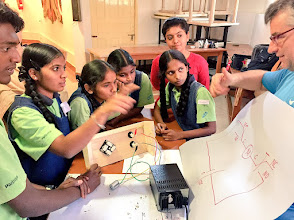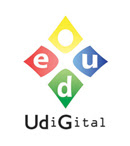Although Inventors4Change starts in 2013, the connections with India actually begin in 2005, since a member of UdiGitalEdu, Eduard Muntaner-Perich, had volunteered several times at the Shanti Bhavan school, first independently, and then thanks to some development cooperation grants from the University of Girona.
During these first stays, his project focused on training teachers in digital skills and promoting coding and educational robotics as cross-cutting learning tools that help children develop soft skills such as creativity, critical thinking, teamwork, curiosity and empathy.
In 2010 the UdiGitalEdu group was born, and its team replicated what Eduard had been doing in schools in India, but now in multicultural schools in Catalonia. So, from that moment, projects in India and Catalonia were conducted in parallel. In India, we started a collaboration that still continues today with the Parikrma schools.
In 2013, we had the idea to connect the schools we were working with in India, with the Catalan schools in our surroundings. So Inventors4Change was born, with the aim of promoting global citizenship education and maker education methodologies among schools for underserved communities. In this way, paired teams of children from India and Catalonia, for a few months every year, researched a social issue, discussed it, and then co-created a digital story using Scratch.
India and Catalonia were soon joined by Colombia, a country with which UdiGitalEdu had ties thanks to two universities: ICESI and Universidad El Bosque.
In 2017 the project took a big leap as it obtained funding from the European Commission, becoming a European Erasmus+ project, called InventEUrs. This allowed us to expand the network of schools until 2019, by adding some European countries (United Kingdom, Romania and Italy) and other countries outside Europe (Argentina and Canada). When InventEUrs ended, more than a thousand children from 8 countries had been co-creating digital stories in mixed teams with children from different countries. In addition, the European project allowed us to create a MOOC to provide online training to teachers from all over the world, and a digital platform to help teachers find classes to collaborate with.
Finally, in 2021 the InventCat project was born, which also has European funding, in this case an aid for projects of specialization and territorial competitiveness. InventCat is still taking its first steps and will allow us to promote co-creation between students and teachers from local schools in Catalonia, which are sometimes very close to each other, have very interesting pedagogical projects, but do not know each other. In addition, InventCat will allow us to create a new online platform for teachers and also for children, which will follow the phases and methodology created during all these years of Inventors4Change, and will bring together educational materials and resources for teachers to learn creative computing and maker education.
And in parallel to this entire process, the UdiGitalEdu team continues to travel to India whenever possible, to keep helping the schools where all this story started, and also creating other connections with organizations in Bangalore that have similar objectives.

















